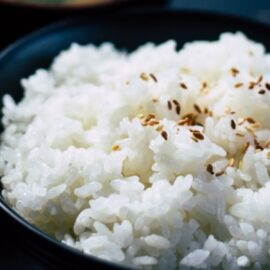

This article is an excerpt from the Shortform summary of "The Plant Paradox" by Steven R. Gundry. Shortform has the world's best summaries of books you should be reading.
Like this article? Sign up for a free trial here .
Why do we gain weight? What helps people maintain their weight in the long run?
If you’re wondering why do we gain weight, looking at lectins is a start. Keep reading to understand the answer.
Why Do We Gain Weight on Diets?
There are countless diets out there—including low carb, ketogenic, and low-fat/whole-grain diets—but most don’t address the root issue, which is that the food that you eat and products you use trigger biological responses in your body that make you fat or unhealthy. Additionally, many diets focus on major short-term efforts that produce quick results but don’t change long-term habits, so you gain the weight right back.
You Can’t Ignore Lectins
It turns out that the smallest things can cause the biggest problems. Lectins are large proteins contained in the seeds, grains, skins, rinds, and leaves of most plants, as well as in the meat, milk, and eggs of grain- and soy-fed chickens, cows, pigs, and seafood. They are toxins that wreak havoc on your internal health, causing weight gain, inflammation, and other physical issues.
Lectins break through your gut wall and into other areas of your body. Your immune system recognizes the lectins as foreign invaders and attacks. In order to fight the war on lectins, your body needs its soldiers—white blood cells—to be well fed, so it diverts calories from your muscles and brain and stores them as fat (fuel) for your white blood cells.
Why do we gain weight with lectins? Our body makes you hungrier so you’ll ingest more calories to fuel the battle. Your body stores the fat near the battlefront to make it easily accessible to the white blood cells (in other words, belly fat is a sign of a battle happening in your gut). So being overweight is a sign that a battle is going on inside your body.
Lectins also masquerade as certain hormones, in some cases instructing your cells to continually store fat.
Lectins’ fattening effects were beneficial to our ancestors because gaining weight gave them a better chance of surviving winter, when food was scarce. But in today’s context, lectins and their fattening effects are no longer helpful but harmful.
Why Do We Gain Weight by Eating Wheat?
Of the four sources of gluten, wheat is the most prevalent in most people’s diets, and not only does it have addictive qualities, but it also promotes weight gain.
This means, contrary to what you’ve been taught, white bread and white rice are less fattening and easier on your digestive system than wheat bread and brown rice. Skeptical? Consider this: The billions of people in Asia who eat rice as a staple in their diets eat white rice, and on the whole, they don’t suffer from epidemics of obesity, heart disease, and diabetes as commonly as Americans do.
Gluten is actually not the most harmful lectin in wheat—wheat germ agglutinin (WGA) is. Why do we gain weight from WGA? It acts like insulin, causing weight gain and insulin resistance by pumping sugar into fat cells, where that sugar turns into fat. WGA also blocks sugar from nourishing muscles, instead turning that sugar into fat.
Artificial Sweeteners Cause Weight Gain
Why do we gain weight even though we’re replacing sugars? Although you may reach for a diet soda to avoid weight gain, the artificial sweeteners it contains actually cause you to put on weight.
When your tongue detects anything sweet—whether it’s from sugar, fruit, or sweeteners—your brain concludes it must be summer, which cues your body to store fat for the winter. This has several harmful effects on your body.
Your body not only goes into fat-storing mode, but it also craves more sweets. Humans, like many animals, evolved to stock up on fat during summer to prepare for winter, when food is more scarce, so you’re wired to eat as much sweet stuff—and get as many calories—as possible. This is how sweeteners make you crave sugar and ultimately gain weight.
Endocrine Disruptors
Endocrine disruptors—also called hormone disruptors—mimic hormones (mostly estrogen), causing weight gain, early puberty, and a host of other health issues. Why do we gain weight? Endocrine disruptors can be hard to avoid because they’re nearly everywhere, but there are alternative options.
- Instead of Teflon and other nonstick cookware, use ceramic cookware or items that are PTFE- and PFOA-free.
- Instead of plastic containers with BPA, use glass or stainless steel containers.
- Instead of plastic bags and plastic wrap, use reusable cloth bags or wax paper.
- Instead of sunscreens with parabens, use a sunscreen with titanium oxide.
- Instead of hand sanitizers with triclosan, use soap and hot water.

———End of Preview———
Like what you just read? Read the rest of the world's best summary of Steven R. Gundry's "The Plant Paradox" at Shortform .
Here's what you'll find in our full The Plant Paradox summary :
- Why eating more vegetables isn't enough, and why some vegetables are toxic to your body
- The science behind lectins and how they tear apart your body, making you fat and sick
- The 6-week program to get your body back on healthy grack






